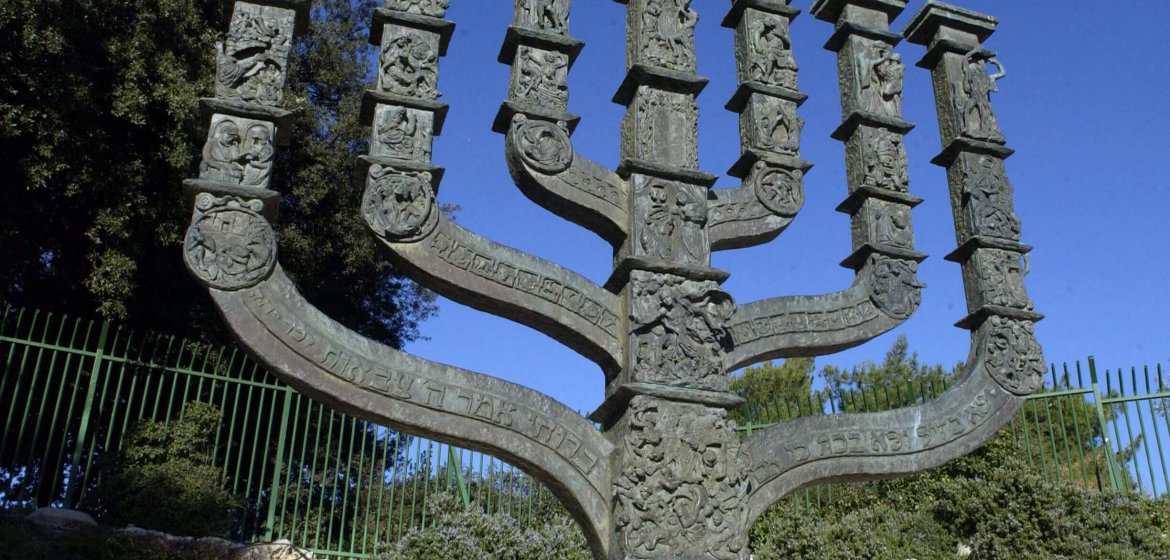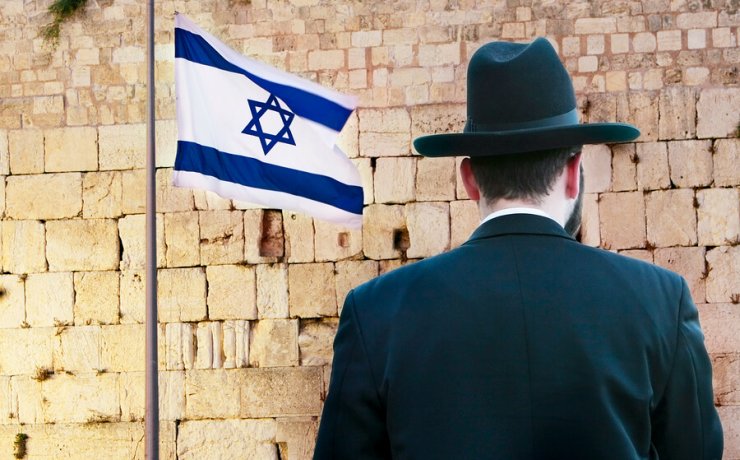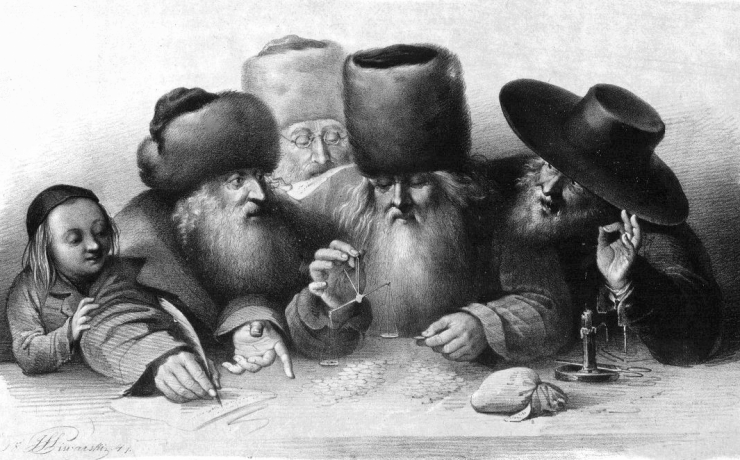“To all our Jewish friends, neighbors, and relatives, wherever you are in the world, let me wish you a very Happy Chanuka.” After giving honorary mention to the excellent jelly doughnuts he tasted in Golders Green on his recent campaign trail, Prime Minister (UK) Boris Johnson continued his message for Chanukah 5780 (2019) by declaring: “[i]t is a time to celebrate not just the miracle of the oil but also your unique identity. To pop the Menorah in the window and say to the world—just as Judah and his small band of poorly equipped Maccabees said to Antiochus III and his mighty Greek army all those years ago—‘I am Jewish and I am proud of it!’”
It is no longer surprising to see a right-wing leader celebrate Jewish identity and uniqueness. An ever-growing number of right-wing political figures have been embracing the Jewish people and the State of Israel. At the other end of the political spectrum, left-wing parties and their leaders—Jeremy Corbyn being one particularly extreme example—are struggling with a growing problem of anti-Zionism that hints at an emergent anti-Semitism. The United States is a similar case in point: President Trump recently signed an executive order that combats anti-Semitism by strengthening provisions to disallow federal funding of institutions exhibiting racist policies. At the same time, the Democratic Left in the US routinely condemns and criticizes Israel, with some even calling for diverting foreign assistance dollars from Israel to the Gaza Strip in humanitarian aid.
This Right-Left split is prevalent in other countries such as Spain and Hungary, where the Right stands with Israel and celebrates Jewish identity while the Left frequently supports anti-Israel organizations and is often complicit in anti-Semitic stirrings. Positions typical of the 20th Century Europe, when Jews feared the nationalist and anti-Semitic Right and pinned their hopes on the liberal Left, have to a significant degree been reversed: The anti-Semitic mood prevalent in parts of 21st Century Europe is a strange amalgam of (Islamic-based) pro-Palestinian prejudice and (leftist) anti-capitalist and anti-globalist sentiment (often also anti-American). This eclectic but cohesive alliance borrows anti-Semitic tropes from a dark period of extreme European nationalism.
That Israel specifically and the Jewish people generally have become darlings of the global Right tells us something both about the nature of right-wing politics as well as about Israel and the Jews. In the present essay, I will attempt to profile the theoretical underpinnings of this relationship, with a specific focus of Charedi society, the most religiously conservative sector in Israel.
[T]he Charedi parties’ recurring choice to participate in Israel’s right-wing governments is not coincidental. The preference reflects a natural gravitational pull toward the camp that celebrates Jewish identity and its reflexive distancing from a universalist left.
The close affiliation of Charedi parties with the Israeli Right is a much-discussed issue, in both a strictly political sense and in a broader social context. Some understand this relationship as being instrumental alone, reflecting common interests rather than common values. Others see the connection between Charedim and the Right as shallow and fragile, predicating the association on ingrained Charedi suspicion of non-Jews (Arabs, in the Israeli case) or on the Left’s disdain of religion, but not on deeper grounds of policy and principle. I believe that this approach is misguided, and will argue that the decades-long Charedi participation in Israel’s right-wing governments reflects a gravitational pull toward the camp that celebrates Jewish identity. I will further claim that the Charedi society is fundamentally predisposed toward Jewish nationalism, that its decision to stand on the sidelines of the Zionist project was a strategic decision in line with these tendencies, and that decision is currently being revisited—in practice if not in principle.
The Charedim and the Right
Moshe Gafni, leader of the Charedi-Litvish Degel HaTorah party, is no right-wing enthusiast. “I am not on the right,” he stated simply at a recent conference. Earlier comments he has made substantiate the assertion. At a 2017 conference hosted by the Israeli (left-wing) Haaretz newspaper, Gafni declared that “on policy issues I stand closer to the Left’s position,” and even declared that “the Palestinians were here before us and we displaced them.”[1] Notwithstanding his preference for the liberal position on the Palestinian issue, Gafni explained that his party cannot participate in leftist governments “because you sit with the Reform.”
At a 2017 conference hosted by the Israeli (left-wing) Haaretz newspaper, Gafni declared that “on policy issues I stand closer to the Left’s position,” and even declared that “the Palestinians were here before us and we displaced them.”
Gafni’s closing comment suggests that a mere technicality prevents his Charedi party from joining a left-led coalition; Charedi parties will be ready to join a leftist bloc just as soon as the Left abandons its alliance with Reform Jews. But in reality this is all too far from the truth. Neither some accident of history nor the Left’s position vis-à-vis the Reform movement accounts for the Charedi parties’ alignment with the Israeli Right.
Rather, the historic partnership between the Charedi parties and the Israeli Right was formulated by Rav Shach zt”l in his famous 1990 speech. Rav Shach was addressing the attempt made by (then Treasury Minister) Shimon Peres to overthrow Yitzchak Shamir’s unity government. Peres, in an effort to create a leftist government under his own leadership, joined forces with the young and talented politician Aryeh Deri who was to deliver the Charedi Knesset seats that Peres needed for his coalition. The attempt, which relied on a naive belief that Rav Shach would give his blessing to the plan, ended in total failure. In his public response, Rav Shach articulated his rejection of the Israeli Left and his absolute refusal to partner with them.
Rav Shach’s remarks were delivered at the Degel HaTorah party convention at the Yad Eliyahu Stadium in Tel Aviv. Rather than address the politics of the moment, Rav Shach launched an all-out attack on the secular culture of Israel’s left, thundering: “What is your culture? English? Gentiles know English too! If you have no connection to your Father you are doomed to be lost. These secular Jews have nothing but soccer to think about.” The speech came to be known as the “Hare Speech” (or “Hare and Pigs Speech”) on account of Rav Shach’s later comment that “If there are [people on] kibbutzim who are ignorant of Yom Kippur, Shabbos, or Mikveh, who raise hares and pigs, then how can they be considered Jews?”
Aside from articulating his strident position against joining a Labor-led government, Rav Shach communicated his understanding of what it means to be part of a Jewish nation. While he recognized that the secular community in Israel would not suddenly become religiously observant, Rav Shach expected that it would preserve an overall Jewish character and maintain some strains of connection to its roots and to Jewish tradition. When Rav Shach referred to those who “are ignorant of Yom Kippur, Shabbos, or Mikveh” he was not demanding full compliance with halacha as a condition for acceptance, but rather a basic awareness and knowledge of what differentiates Jews from other nations. There can be no hope for a Judaism that lacks such a fundamental awareness, hence “if you have no connection to your Father you are doomed to be lost.”
This is no technical matter of conflicting alliances, but rather a deep and fundamental difference in worldview dividing the Israeli Right and Left. Those on the Israeli Right know about Yom Kippur, Shabbos, and Mikveh, while those on the Left do not. To put it simply, the Right maintains its Jewish identity.
Herein lies the core connection between the religious community and the Israeli Right. This is no technical matter of conflicting alliances, but rather a deep and fundamental difference in worldview dividing the Israeli Right and Left. Those on the Israeli Right know about Yom Kippur, Shabbos, and Mikveh, while those on the Left do not. To put it simply, the Right maintains its Jewish identity.
The Foundation of the Israeli Right: Jewish Identity
R’ Avraham Ravitz, Degel HaTorah’s senior Knesset representative from the party’s founding in 1988 until his retirement in 2008, expounded on his party’s refusal to participate in a government led by the Left: “When we need to choose between the two camps, it behooves us to set aside considerations that might be correct in and of themselves and consider instead the general characteristics of the two camps and their respective bases.” In other words, there are overarching considerations that might outweigh narrow, more immediate interests. He continued to explain:
As a rule, those on the Right can be characterized as a traditional camp that respects and is connected to original Jewish values. This camp does not aspire to replace ancient Jewish culture with a new culture, nor did this camp participate in the efforts to rid the original migrants of their religiosity in the State’s early years. These are warm, feeling, and simple Jews like us.[2]
Ravitz’s comments strongly reflect the respective images of the Right and Left in Israeli consciousness. The Israeli Right is traditional, while the Left advocates a “new culture.” But to be sure, this difference is not merely between a folksy, ethnic crowd and an enlightened elite, nor does is only compare the warmth of the simple Jew against the rationalism of the educated class. At its core, the difference lies in deeply set values. [3] Yaniv Sagi, Chairman of Israel’s leftist Meretz Party, stated the obvious in a very recent interview, saying that “equality is the central principle of the Left.”[4] Synonymous with “equality,” if not even more precise for our purposes, is “universalism.” The Israeli left believes in and promotes a universalist worldview, from which it forms a set of policies that impact a broad range of areas. The Israeli Right, on the other hand, embraces a unique Jewish particularism, which in turn informs its various policy platforms.
But to be sure, this difference is not merely between a folksy, ethnic crowd and an enlightened elite, nor does is only compare the warmth of the simple Jew against the rationalism of the educated class. At its core, the difference lies in deeply set values.
The Left aspires towards a neutral state (of a light Jewish flavor), one in which each individual is a “global citizen.” The Liberal conception of individuality sees each person as an atom floating in a universe of similarly unaffiliated atoms. Such a worldview is naturally antagonistic towards any institution that compromises perfect individuality. Thus, any cohesion between people along national, religious, or ethnic lines is objectionable; even the basic traditional family unit, the cornerstone of any group identity, is problematic. Leftist ideology calls for a state that will replace those particularistic institutions and serve as a local enforcer of international laws and norms informed by universal human rights.
If the greatest threat to leftist ideology is national identity and its particularistic instincts, then the opposite holds true for the Right. National identity, and the organization of a nation-state, are essential characteristics of the right-wing worldview. For the Israeli Right, this means that the State is first and foremost a Jewish state, and only then a democratic one, rather than the reverse. Local identity, an identity deriving from Jewish identity and carrying religious, cultural, and ethical implications, is of a higher order than universalist individuality and personal autonomy. The role of the State is to facilitate the successful functioning of various decentralized institutions—the local authority, the community, the family, and so on—all of them operating within a distinctly Jewish framework.
If the greatest threat to leftist ideology is national identity and its particularistic instincts, then the opposite holds true for the Right. National identity, and the organization of a nation-state, are essential characteristics of the right-wing worldview. For the Israeli Right, this means that the State is first and foremost a Jewish state, and only then a democratic one.
It is precisely this commitment to Jewish identity on the part of the Israeli Right that attracts global right-leaning leaders, such as Johnson and Trump, and causes them to see Israel as a natural ally. Israel’s comfort with its own particularism encourages these leaders’ affection for Israel and inspires the global Right to see Israel as a model for their own nationalism (or nationalistic aspirations). At the same time, left-leaning advocates and leaders see Israel’s model of successful nationalism as a threat to their conception of an ideal global order.[5]
The same holds true concerning the affinity of traditional Jews, including Charedi society, toward the political Right. Jewish identity is the most obvious reason why Charedi political parties in Israel are aligned with the right-wing bloc, becoming in recent years an integral part thereof. Recurring surveys indicate that members of Israel’s Charedi community hold political views that are firmly on the Right—and often the most right-wing of all Israeli sectors.[6] The longstanding alliance between the Right and Charedi society cannot be disassociated from political positions, notwithstanding Moshe Gafni’s recent statement in which he asserted “I am on the Right, even though on many policies I am not.”[7] The statement is hardly coherent, and his assertion that “Degel HaTorah’s voters’ views are closer to the Left’s positions”[8] is entirely divorced from reality.
Jewish Nationalism and the Zionism Question
The idea of “Jewish Nationalism” is an essential component of Jewish tradition. In his essay on Zionism (published in 1920), Rabbi Moshe Shmuel Glasner wrote that “the Torah is a national constitution; at its core is the assumption of a nation established in its own homeland.”[9] Indeed, Avraham Avinu was not promised the Torah or its Mitzvos, but rather a plot of land—“To your offspring I shall give this Land”—upon which his descendants would conduct an elevated national life under Hashem’s watchful eye. Drawing on themes found in early Rishonim (such as Rashi and Ramban),[10] R’ Glasner added that observance of the Torah is primarily intended for those living in the Holy Land and that many Mitzvos carry direct national and political purpose. As Dr. Yoram Hazony has recently written at length, it was the Torah that first promoted a nation-state model to replace the empire-building instincts of the ancient world.[11]
Unlike R’ Glasner, most Charedi rabbinic leaders chose not to join the Zionist project. Yet, this decision was not made because of some inherent opposition to the nationalist ethos, but because they saw in Zionism an anti-nationalist agenda, believing that Zionist efforts ran contrary to fundamental principles of Jewish nationalism. In their decision to refrain from joining the Zionist movement in establishing the State of Israel, the Moetzes Gedolei Hatorah of Agudas Yisrael wrote that “the establishment of a Jewish state is possible only if the laws of the Torah are recognized as the primary law of the land.” The rabbinic leadership of the time refused to participate in the Zionist venture because “a country of Jews that is not founded on the authority and laws of the Torah violates the Source of Israel and denies the essence and character of the Jewish people, uproots the foundation of our nation’s survival and it ceases to be a Jewish country.”[12]
In other words, not only was rabbinic opposition to Zionism not founded on an anti-nationalistic platform but on the contrary: the importance of distinctly Jewish nationalism, alongside the belief that a Jewish State not governed by Torah law is the very opposite of national self-realization, blurring Jewish uniqueness in service of a universalistic vision, formed the basis of Charedi resistance to Zionism.[13]
[T]he importance of a distinctly Jewish nationalism, alongside the belief that a Jewish State not governed by Torah law is the very opposite of national self-realization, blurring Jewish uniqueness in service of a universalistic vision, formed the basis of Charedi resistance to Zionism.
Perhaps the most elegant presentation of the Charedi stance vis-à-vis Zionism was presented by R’ Uriel Zimmer. Writing in 1959, he summarized the basic Charedi position as claiming that Zionism represents the ideology whereby “Jews must become a nation like all other nations.” To the Charedi ear, Zionism is understood as an attempt to redefine Judaism itself: “The Jewish people, which had up to that point been, in their own consciousness and in the minds of the world, a unique entity, a special creation of God, must become something different—a nation as understood by the general community of nations.”[14]
The statement that Zionism meant to eradicate Jewish particularism is, of course, arguable. The truth of the assertion will, in all likelihood, depend on the different schools of thought within the Zionist movement and on the personal disposition of their relevant leaders. Indisputable, however, is the fact that much of Charedi society perceived (and continues to perceive) the Zionist position in this light. Charedim saw in Zionism an attempt to apply a nationalist framework to Judaism, not one that would support Jewish identity but rather one that would reject it by insisting that the Jewish nation become like all other nations. As such, Charedi society opposed the movement specifically because of their innate nationalist impulses.[15]
In this context, it is appropriate to mention George Eliot’s comments regarding Jewish nationalism, in which she notes that the Jewish nation affords humanity a “portraiture of a people educated from an earlier or later period to a sense of separateness unique in its intensity, a people taught by many concurrent influences to identify faithfulness to its national traditions with the highest social and religious blessings.” In a vein remarkably close to the Charedi ethos, Eliot, writing (in 1879) well before the new Jewish nationalism had taken hold, continues:
Thenceforth the virtuous elements of the Jewish life were engaged, as they had been with varying aspects during the long and changeful prophetic period and the restoration under Ezra, on the side of preserving the specific national character against a demoralizing fusion with that of foreigners whose religion and ritual were idolatrous and often obscene. There was always a Foreign party reviling the National party as narrow, and sometimes manifesting their own breadth in extensive views of advancement or profit to themselves by the flattery of a foreign power. Such internal conflict naturally tightened the bands of conservatism, which needed to be strong if it were to rescue the sacred ark, the vital spirit of a small nation—”the smallest of the nations” [….] [A]ll that need be noticed here is the continuity of that national education (by outward and inward circumstance) which created in the Jews a feeling of race, a sense of corporate existence, unique in its intensity.[16]
Eliot correctly wrote that the threatening winds that blow from the Greeks, and even more menacingly, from assimilating Jews of then and now, undermine Jewish nationalism. It was only the “National party” that safeguarded that pure “vital spirit” (or the pure jug of Chanukah oil)—the group that remained loyal to God and the Jewish tradition, zealously ready to risk all to protect the national identity of the Jewish people. The Charedim, who certainly see themselves in the role of preserving the pure jug of oil from foreign pollution, could clearly claim seniority in the project of Jewish nation-building. And yet, they refrained from participating in building a state they feared would compromise the essence of true Jewish identity.
It was only the “National party” that safeguarded that pure “vital spirit” (or the pure jug of Chanukah oil)—the group that remained loyal to God and the Jewish tradition, zealously ready to risk all to protect the national identity of the Jewish people. The Charedim, who certainly see themselves in the role of preserving the pure jug of oil from foreign pollution, could clearly claim seniority in the project of Jewish nation building.
Here we return to the difference between the Israeli Right and Left, and to the evolution of Zionism itself. At the time of the State’s creation, it was the Left who led the Zionist movement and the founding of the State. A far cry from the universalism of today, they might indeed have marched under the banner of “we must be like the nations of the world,” but they did so while maintaining a proud nationalism. Over time, the Israeli Left—at least its vocal majority—shed its original nationalist-Zionist characteristics in favor of a universalism that frowns (or disallows outright) all forms of particularistic group identities. A significant portion of its second and third generation, whether openly or otherwise, have moved towards a post-Zionism of one sort or another. Their place in Israel’s nationalist aspirations has been filled by the Israeli Right, who proudly bear their Jewish identity and with whom Charedi society is far more comfortable.
***
When Boris Johnson praised Jewish bravery in the Chanukah story, he was likely not expressing some deep insight into the Hasmonean was against the assimilating agenda of the Greeks. But he did hit on a key point in celebrating our ability to declare “I am a Jew and proud of it.” This was indeed one of the central turning points in the battle on Antiochus and his decrees against the Jews. The Book of 2 Maccabees tells us that “no person was able to keep Shabbos or observe the Holidays of our fathers, or even simply to state that he is a Jew.” Indeed, the Greek decrees directly targeted the unique national identity of the Jews: the Jewish calendar, Shabbos, and Bris Milah are all essential characteristics of our basic Jewish identity and experience.
The reaction of the Hasmoneans to Greek darkness came in two forms. On a religious-spiritual level, they cleansed the Beis Hamikdash and instituted a new Mitzvah—the entirely Rabbinic festival of Chanukah. They sought to reestablish the commitment to Torah study and brought about the flourishing of Torah shebaal peh, as recorded in Seder Olam: “From this point forward, tilt your ear to hear the words of the Sages.”[17] At the same time, they also reconstituted the Kingdom of Judah in the most physical sense, as the Rambam writes: “Kingship was restored to Israel for more than two hundred years, until the destruction of the Second Temple.”[18]
Our Charedi community focused its nation-building in the religious-spiritual sphere through Torah observance and preserving the unique culture of a Jewish community. These preserved our uniqueness, our Jewish identity, throughout the generations. During long years of harsh exile, there was simply no other way to do so. Alongside these efforts, the Charedi community has, in recent years, begun to contribute in the second domain through civic engagement and assuming responsibility even for the worldly aspects of nationhood. This activity, pursued in collaboration with the Israeli Right, stands to develop further in the years ahead; such expansion will surely be of great benefit to Israel and will do wonders to elevate the Jewish identity of Israeli nationalism.
True, Charedi Judaism will continue to warn of the danger attendant to Zionism and the State. And justifiably so. As a matter of public policy, deep concerns remain not only with regard to political nationalism but also concerning any engagement with secular Israeli culture, its institutions, and attempts to blur the lines between Charedi and secular societies. Yet the more Zionism reflects a strong Jewish identity, rather than the call of “we shall be like the nations,” these concerns will be somewhat muted.
Alongside the ongoing need for vigilant protection of our values, a candid look at the reality on the ground shows an ever-increasing Charedi presence in the building and flourishing of the State. Together with its traditional role in preserving Jewish identity—a fully national role, as Eliot so eloquently stated—the Charedi community is playing a growing role in political nationalism too, where it can inject much Jewish meaning value. This trend is a blessing; I am proud to be part of it.
[1] Gafni’s complete comments can be viewed here: https://bit.ly/36jOuGU (Hebrew).
[2] See D. Zoldan, HaCharedim HaChadashim (2019), pp. 122-123 (Hebrew).
[3] Nissim Mizrahi cogently articulated this in a recently published interview in Haaretz, wherein he stated that one must not cast the political divide in Israel along such simplistic lines: “Anyone who attempts to paint it in ethnic terms alone, thinking that ethnicity or orientalism are the primary organizing principles, will be mistaken time and again.” Haaretz (12/26/2019): https://www.haaretz.co.il/magazine/.premium-MAGAZINE-1.8317698 (Hebrew)
[4] Yaniv Sagi, Ynet (12/29/2019): https://www.ynet.co.il/articles/0,7340,L-5650190,00.html (Hebrew).
[5] Israel was once a celebrated cause among the global Left. Liberal thinkers such as Sartre initially supported a Jewish state and sang its praises. That said, this support slowly eroded, and has been gone for decades. We will not delve here into the complex processes that brought about these dramatic changes, but presumably, while the Jewish nation still held victim status following the Holocaust their cause was a valid one for the Left. Today, when Israel is no longer a victim the Left has eschewed it while the Right celebrates its successes.
[6] For example see this Pew study: https://pewrsr.ch/37iFUIj.
[7] See LaDaat from earlier this month: https://ladaat.co/archives/37562.
[8] See above n. 1.
[9] See Rabbi M. S. Glasner, “Zionism in Light of Faith” in Chazon Torah MiTziyon (ed: S. Federbush), Jerusalem, 1920, p. 67 (Hebrew).
[10] See Ramban al HaTorah, beginning of Parshas Shoftim.
[11] See Hazony, The Virtue of Nationalism (2018).
[12] “The Ruling of Moetzes Gedolei Hatorah Regarding The Partition” from HaPardes 11, 6 (Hebrew), retrieved from https://www.hebrewbooks.org/pdfpager.aspx?req=12084&st=&pgnum=9.
[13] This assessment does not include the virulently anti-Zionist positions held by some Chassidic leaders, for whom Israeli is inherently evil and even satanic, and whose opposition (as the Satmar Rebbe expounds) is founded on theological foundations that mainstream Charedi society does not espouse.
[14] Uriel Zimmer, Yahadut HaTorah vHaMedina (2012), p. 12.
[15] As noted above, there clearly exist within Charedi society a multiplicity of approaches to this issue. For the purposes of this essay I employed and presented what I understand as the mainstream view (some will call it the mainstream Litvish view).
[16] George Eliot (Mary Ann Evans), “The Modern Hep! Hep! Hep!” Chapter XVIII of Impressions of Theophrastus Such (1879).
[17] Seder Olam Rabba, 30.
[18] Mishneh Torah, Laws of Chanuka 3:1.
photo: MOSHE MILNER, GPO








Dear Rabbi Pfeffer,
I enjoyed your article about charaidim and the right. I don’t think that I can argue with anything you wrote. The only thing that on your comment about Gafni’s statement about the charadim being closer the left than the right I believe you missed the point.
There are two aspects of the negative relationship of the charaidi leadership to Zionism. One you addressed and did a good job of it, the other you seemed to have missed entirely. The stressing of the difference between true Jewish Nationalism and secular nationalism was clearly stated and as such must be stressed.
But there is another point that is no less important. I would call in Messianism. The secular Zionist movement was a form of secular messianism. To put an end once and for all to the “Jewish Problem”, so that the Jews can finally find a solution the two thousand years of galus, persecutions at al. The religious Zionists adopted this approach and put a kippa on it. They called it “reishit ztemichat geulateinu”. (a prase put into the prayer for the wellfare of the state by Shai Agnon. Check in out.)
Redemption is a Heavenly process and must remain that way. The prohibition on pushing the redemption is not an invention of Satmar as I am sure that you are aware. Rav Shach constantly mentioned the prohibition of antagonizing the nations of the world.
The Jewish right’s desire to expand the borders of the state at the expense of antagonizing the nations of the world is motivated by Messianic emotions which come from the Jewish heart but not from the Jewish Torah oriented mind.
That is what Gafni meant when he said that he closer to the left that the right. Albeit from a totally different world view, but non the less it does find common ground with the left. And when he made that statement, he was just echoing what he heard many times from Rav Shach.
It seems haredim are prepared to flight down the last non-haredi soldier, be protected by the last non-haredi policeman, to ride on the last non-haredi built or driven train, to have their garbage collected by the last non-haredi garbageman, to feed off the last non-haredi earned shekel, an to be treated by the last non-haredi physician — but he must be the BEST doctor. This is not being right wing, It is being opportunistic and cynically exploitive and dishonest. If tomorrow Israel were to have a radical left wing government that was willing to pay the same price (or better yet even more) to buy the parties then haredim would be leftwing.
Looking at Marx’s own concept of socialism and at its evolution over time, one should recognize that it is an alternative to Judaism that substitutes the State for G-d. Ethnic Jews of the socialist persuasion, especially those with political power, threaten the Jewish nature of Israel because their socialist religion disdains Judaism and hopes to eradicate it, no matter how much they’ve hijacked Jewish terminology to serve their ends.